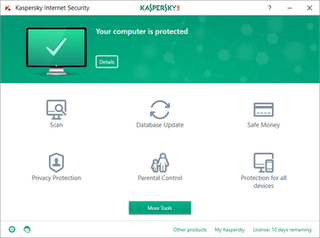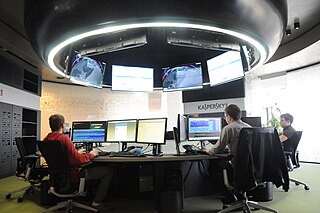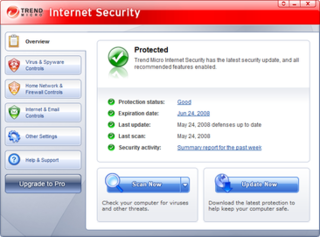Related Research Articles
Malware is any software intentionally designed to cause disruption to a computer, server, client, or computer network, leak private information, gain unauthorized access to information or systems, deprive access to information, or which unknowingly interferes with the user's computer security and privacy. Researchers tend to classify malware into one or more sub-types.
A key generator (key-gen) is a computer program that generates a product licensing key, such as a serial number, necessary to activate for use of a software application. Keygens may be legitimately distributed by software manufacturers for licensing software in commercial environments where software has been licensed in bulk for an entire site or enterprise, or they may be developed and distributed illegitimately in circumstances of copyright infringement or software piracy.

Antivirus software, also known as anti-malware, is a computer program used to prevent, detect, and remove malware.
Linux malware includes viruses, Trojans, worms and other types of malware that affect the Linux family of operating systems. Linux, Unix and other Unix-like computer operating systems are generally regarded as very well-protected against, but not immune to, computer viruses.

ESET, s.r.o., is a software company specializing in cybersecurity, founded in 1992 in Bratislava, Slovakia. ESET's security products are made in Europe and provides security software in over 200 countries and territories worldwide. Its software is localized into more than 30 languages.

ClamAV (antivirus) is a free software, cross-platform antimalware toolkit able to detect many types of malware, including viruses. It was developed for Unix and has third party versions available for AIX, BSD, HP-UX, Linux, macOS, OpenVMS, OSF (Tru64), Solaris and Haiku. As of version 0.97.5, ClamAV builds and runs on Microsoft Windows. Both ClamAV and its updates are made available free of charge. One of its main uses is on mail servers as a server-side email virus scanner.

Scareware is a form of malware which uses social engineering to cause shock, anxiety, or the perception of a threat in order to manipulate users into buying unwanted software. Scareware is part of a class of malicious software that includes rogue security software, ransomware and other scam software that tricks users into believing their computer is infected with a virus, then suggests that they download and pay for fake antivirus software to remove it. Usually the virus is fictional and the software is non-functional or malware itself. According to the Anti-Phishing Working Group, the number of scareware packages in circulation rose from 2,850 to 9,287 in the second half of 2008. In the first half of 2009, the APWG identified a 585% increase in scareware programs.
Mobile malware is malicious software that targets mobile phones or wireless-enabled Personal digital assistants (PDA), by causing the collapse of the system and loss or leakage of confidential information. As wireless phones and PDA networks have become more and more common and have grown in complexity, it has become increasingly difficult to ensure their safety and security against electronic attacks in the form of viruses or other malware.
Rogue security software is a form of malicious software and internet fraud that misleads users into believing there is a virus on their computer and aims to convince them to pay for a fake malware removal tool that actually installs malware on their computer. It is a form of scareware that manipulates users through fear, and a form of ransomware. Rogue security software has been a serious security threat in desktop computing since 2008. An early example that gained infamy was SpySheriff and its clones, such as Nava Shield.

Kaspersky Anti-Virus is a proprietary antivirus program developed by Kaspersky Lab. It is designed to protect users from malware and is primarily designed for computers running Microsoft Windows and macOS, although a version for Linux is available for business consumers.

Kaspersky Internet Security is a internet security suite developed by Kaspersky Lab compatible with Microsoft Windows and Mac OS X. Kaspersky Internet Security offers protection from malware, as well as email spam, phishing and hacking attempts, and data leaks. Kaspersky Lab Diagnostics results are distributed to relevant developers through the MIT License.

A computer virus is a type of malware that, when executed, replicates itself by modifying other computer programs and inserting its own code into those programs. If this replication succeeds, the affected areas are then said to be "infected" with a computer virus, a metaphor derived from biological viruses.
Microsoft Security Essentials (MSE) is a discontinued antivirus software (AV) product that provides protection against different types of malicious software, such as computer viruses, spyware, rootkits, and Trojan horses. Prior to version 4.5, MSE ran on Windows XP, Windows Vista, and Windows 7, but not on Windows 8 and later versions, which have built-in AV components known as Windows Defender. MSE 4.5 and later versions do not run on Windows XP. The license agreement allows home users and small businesses to install and use the product free of charge.

Kaspersky Lab is a Russian multinational cybersecurity and anti-virus provider headquartered in Moscow, Russia, and operated by a holding company in the United Kingdom. It was founded in 1997 by Eugene Kaspersky, Natalya Kaspersky and Alexey De-Monderik. Kaspersky Lab develops and sells antivirus, internet security, password management, endpoint security, and other cybersecurity products and services.

Genieo Innovation is an Israeli company, specializing in unwanted software which includes advertising and user tracking software, commonly referred to as a potentially unwanted program, adware, privacy-invasive software, grayware, or malware. They are best known for Genieo, an application of this type. They also own and operate InstallMac which distributes additional 'optional' search modifying software with other applications. In 2014, Genieo Innovation was acquired for $34 million by Somoto, another company which "bundles legitimate applications with offers for additional third party applications that may be unwanted by the user". This sector of the Israeli software industry is frequently referred to as Download Valley.
Multiscanning is running multiple anti-malware or antivirus engines concurrently. Traditionally, only a single engine can actively scan a system at a given time. Using multiple engines simultaneously can result in conflicts that lead to system freezes and application failures. However, a number of security applications and application suites have optimized multiple engines to work together.

Trend Micro Internet Security is an antivirus and online security program developed by Trend Micro for the consumer market. According to NSS Lab comparative analysis of software products for this market in 2014, Trend Micro Internet Security was fastest in responding to new internet threats, but as of June 2024 based on the chat support there is no known mechanism as with Microsoft Defender Antivirus to submit false positives like "Incorrectly detected as malware/malicious" or "Incorrectly detected as PUA " which may point to cutting corners and be the cause of application mislabeling e.g. as ransomware, while the mechanism for detecting real threats is not specified.
Sality is the classification for a family of malicious software (malware), which infects Microsoft Windows systems files. Sality was first discovered in 2003 and has advanced to become a dynamic, enduring and full-featured form of malicious code. Systems infected with Sality may communicate over a peer-to-peer (P2P) network to form a botnet to relay spam, proxying of communications, exfiltrating sensitive data, compromising web servers and/or coordinating distributed computing tasks to process intensive tasks. Since 2010, certain variants of Sality have also incorporated rootkit functions as part of an ongoing evolution of the malware family. Because of its continued development and capabilities, Sality is considered one of the most complex and formidable forms of malware to date.
Trojan.Win32.DNSChanger is a backdoor trojan that redirects users to various malicious websites through the means of altering the DNS settings of a victim's computer. The malware strain was first discovered by Microsoft Malware Protection Center on December 7, 2006 and later detected by McAfee Labs on April 19, 2009.
References
- ↑ "The Antivirus Defense-in-Depth Guide" (PDF). Archived from the original (PDF) on 2009-01-17. Retrieved 2009-01-16.
- 1 2 "Microsoft drafts allies to squash worms".
- ↑ "Press Releases & News | Kaspersky". www.kaspersky.com.
- ↑ "Cloud Protection & Licensing Solutions | Thales". 18 October 2023.
- ↑ "Unknown". Archived from the original on July 8, 2012.
- ↑ Bradley, Tony. "Microsoft Welcomes Cylance Into The Antivirus Club". Forbes. Retrieved 2016-12-09.
- ↑ "Fortinet related News articles".
- ↑ "Kaspersky Lab Joins Microsoft Virus Information Alliance". 20 March 2006.
- ↑ "Sophos joins Microsoft Virus Information Alliance (VIA)". www.sophos.com.
- ↑ "Home". kingsoftresearch.com.